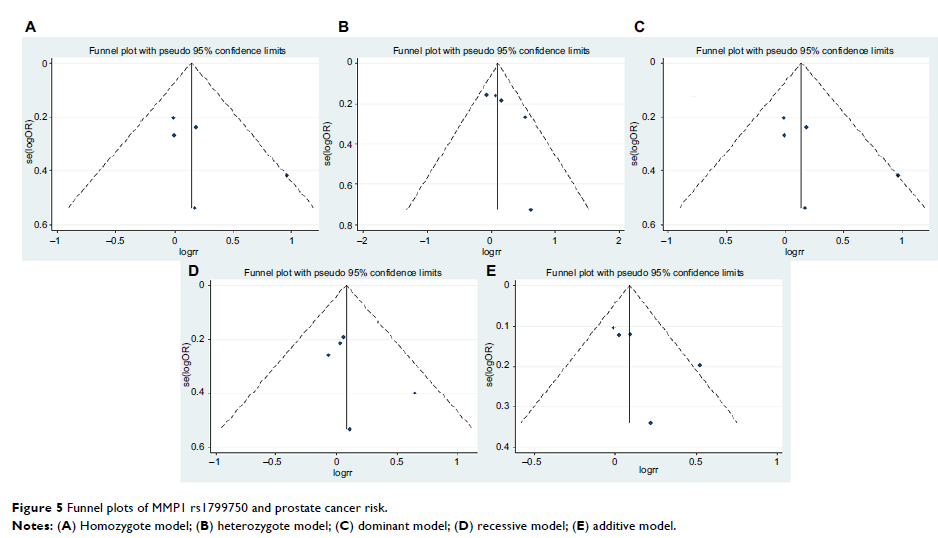108384
论文已发表
注册即可获取德孚的最新动态
IF 收录期刊
- 3.4 Breast Cancer (Dove Med Press)
- 3.2 Clin Epidemiol
- 2.6 Cancer Manag Res
- 2.9 Infect Drug Resist
- 3.7 Clin Interv Aging
- 5.1 Drug Des Dev Ther
- 3.1 Int J Chronic Obstr
- 6.6 Int J Nanomed
- 2.6 Int J Women's Health
- 2.9 Neuropsych Dis Treat
- 2.8 OncoTargets Ther
- 2.0 Patient Prefer Adher
- 2.2 Ther Clin Risk Manag
- 2.5 J Pain Res
- 3.0 Diabet Metab Synd Ob
- 3.2 Psychol Res Behav Ma
- 3.4 Nat Sci Sleep
- 1.8 Pharmgenomics Pers Med
- 2.0 Risk Manag Healthc Policy
- 4.1 J Inflamm Res
- 2.0 Int J Gen Med
- 3.4 J Hepatocell Carcinoma
- 3.0 J Asthma Allergy
- 2.2 Clin Cosmet Investig Dermatol
- 2.4 J Multidiscip Healthc

基质金属蛋白酶基因多态性与前列腺癌风险的关系:汇总分析和系统回顾
Received 18 June 2018
Accepted for publication 8 August 2018
Published 2 November 2018 Volume 2018:10 Pages 5247—5259
DOI https://doi.org/10.2147/CMAR.S177551
Checked for plagiarism Yes
Review by Single-blind
Peer reviewers approved by Dr Justinn Cochran
Peer reviewer comments 2
Editor who approved publication: Dr Antonella D'Anneo
Background: Data from published articles on the relationship between MMP
polymorphisms and prostate cancer risk are conflicted and inconclusive, so a
meta-analysis and systematic review were performed to assess the relationship.
Methods: Relevant research articles were identified from databases using a search
strategy. Studies with the same MMP polymorphisms that could be quantitatively
synthesized were included in the meta-analysis. Five comparison models
(homozygote, heterozygote, dominant, recessive, and additive) were applied, and
a subgroup analysis by case-group sample type was performed. Studies with
different polymorphisms that could not be quantitatively synthesized were
included in the systematic review.
Results: Eleven articles encompassing 22 studies involving 12 MMP
polymorphisms were included in this paper. Among the studies included, 13
studies involving MMP1 rs1799750, MMP2 rs243865, and MMP7 rs11568818 were
quantitatively synthesized for meta-analysis, and the other nine studies
involving nine polymorphisms (MMP2 rs2285053, MMP2 rs1477017, MMP2 rs17301608,
MMP2 rs11639960, MMP3 11715A/6A, MMP3 1161A/G, MMP3 5356A/G, MMP9 rs17576, and
MMP13 rs2252070) were included in the systematic review. Meta-analysis showed
no associations between MMP1 rs1799750, MMP2 rs243865, or MMP7 rs11568818 and
prostate cancer risk overall. Subgroup analysis by case-group sample type
confirmed that no associations existed. The systematic review suggested that
MMP3 11715A/6A and MMP9 rs17576 were associated with prostate cancer risk.
Conclusion: MMP polymorphisms are not associated with prostate cancer risk, except
for MMP3 11715A/6A and MMP9 rs17576. However, it is necessary to conduct
larger-scale, high-quality studies in future.
Keywords: matrix metalloproteinase, polymorphism, prostate cancer, meta-analysis
